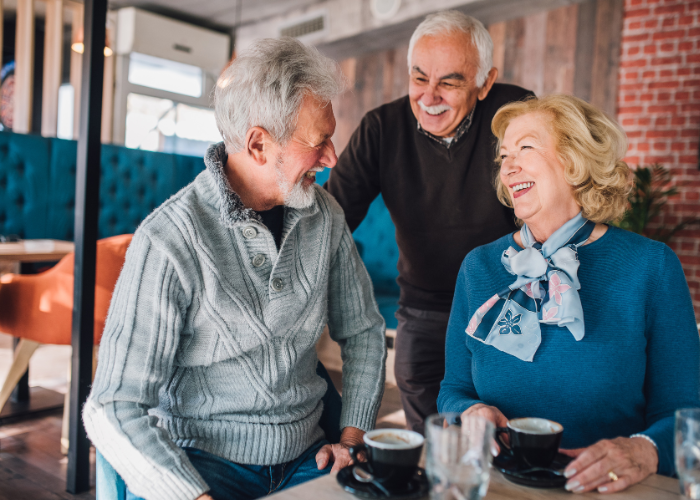IMANA NEWS
Why the International Day of Older Persons Matters In Our Society
15 October 2025

We live in a world obsessed with innovations, speed, and everything new. We are always rushing to push forward. To reach new milestones, break old records.
However, in the process, we often overlook those who were there before us. The people who built the foundations of everything we are building today.
We are talking about the older persons in our lives and communities.
The International Day of Older Persons was created to honor the wisdom and strength of these older people. It also teaches us to interact with them with compassion and empathy.
And, in a world where one in six people will be over 65 by 2050, this observance has never been more significant.
Let us explore why.
Establishment of the Day
The International Day of Older Persons was established in 1990 by the United Nations General Assembly. It is celebrated on October 1st each year.
However, the roots of this can be traced much further back, to 1982.
This was when the World Assembly on Ageing adopted the Vienna International Plan of Action on Ageing.
It was the first international plan to specifically address the rights, well-being, and inclusion of older persons.
The UN elaborated on this framework by 1991 and adopted its Principles for Older Persons.
These were established on five foundations:
- Independence
- Participation
- Care
- Self-fulfillment
- Dignity
The significance of these benchmarks was that older people were entitled not only to recognition but also to our protection and inclusion.
The Purpose of the Day
In its essence, the International Day of Older Persons fulfills three vital functions.
One, it’s a day of celebration. It is a chance to acknowledge the extent older people enrich our lives. They maintain traditions, raise families, mentor the next generation, and remain contributors in countless other places.
Second, it exposes the difficulties they confront.
Many older adults already navigate chronic illness and isolation, too, at times. The World Health Organization also reports that one in six older adults experiences some form of abuse.
This is a fact that requires both our attention and action.
And third, it’s a call to action for policymakers. It’s a reminder to governments and organizations to invest in age-friendly health care and more robust social security systems.
In 2025, the theme is: Older Persons Driving Local and Global Action: Our Aspirations, Our Well-Being and Our Rights.
How is the Day Celebrated?
This important day is marked in different ways around the world.
Let us explore how.
United Nations and Global Events
Expert forums and cultural performances take place each year around the world at the UN Headquarters in New York.
Celebrations in Europe
In Britain, local councils and charities stage tea parties, cultural performances, and intergenerational events where young children can sit with an elder.
In other European countries, such as Germany, ‘senior’ clubs frequently organize music nights and discussions on topics such as health or pension security.
Observances in Asia
Across Asia, schools and non-governmental organizations visit elderly care homes to provide cultural entertainment, as well as free health check-ups. There are also walkathons in honour of older people and discussions on their plights and rights.
In many countries, families also gather to share meals and express respect.
African Traditions
Storytelling and cultural performances are an important part of African culture. On this day, they are modelled around reminding young people about the wisdom of their elders.
Several free medical camps and seminars also take place.
The Americas
In the U.S., organizations such as the AARP organize events such as health fairs, screenings, and campaigns around health care and elder rights.
Further south, countries like Mexico or Brazil also observe the day with family events. Church services that recognize the contributions of older people in the community are also quite common.
The Middle East
In the Middle East, reverence for one’s elders is inextricable from cultural and religious influences. In the UAE and Saudi Arabia, there are intergenerational events, policy conversations, and high-impact programs that focus on how older persons have contributed to moral and cultural values shaping society.
The Elderly and Their Role in Modern Society
Older persons represent more than citizens of the community; they are the heart and soul of families, and a silent force upholding societies.
- In Sub-Saharan Africa, adult grandparents frequently take over the role of primary carers of children. For example, at least 38% of the world’s AIDS orphans are from this region. This has made it necessary for grandparents to step in and take care of these children
- In Japan, older people continue to serve as mentors. They also participate in neighborhood watch programs and assist with disaster-relief efforts. This is a beautiful example of how age does not decrease civic purpose.
- In India, multigenerational families continue to live together. Here, grandparents are important in child care when both parents are working.
These cases make it clear that the elderly are not simply a burden. They are guardians, instructors, and vital pillars of our society.
Their existence is critical to the life of the communities in which they reside.
At IMANA, our mission is to bring care, dignity, and hope to vulnerable populations, including older people, worldwide.
Your support helps make this possible. Please join us in standing with older people and others in need. Contribute to IMANA today so that our shared commitment to compassion can continue transforming lives across generations.